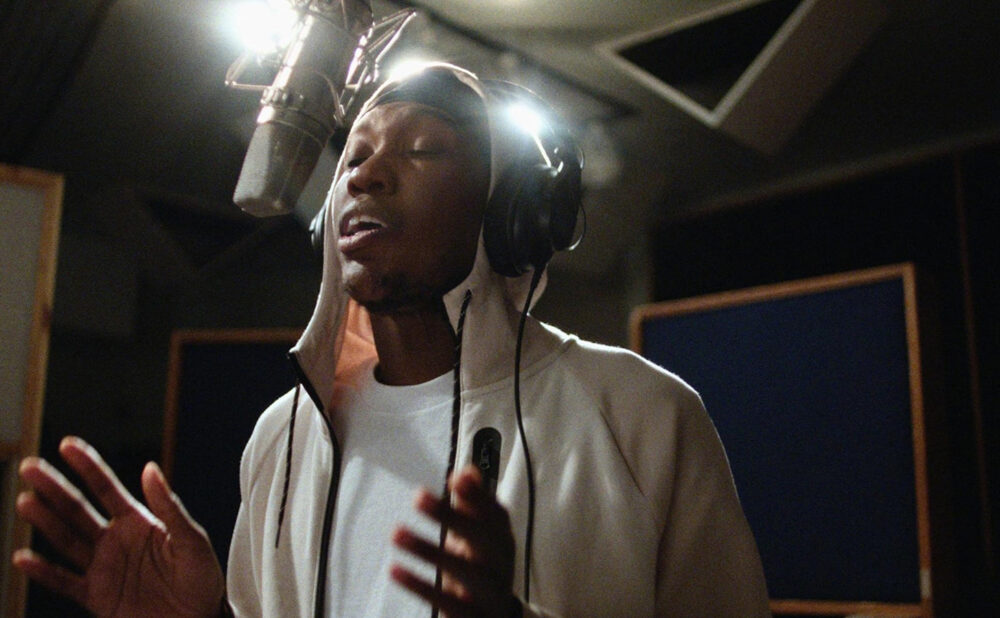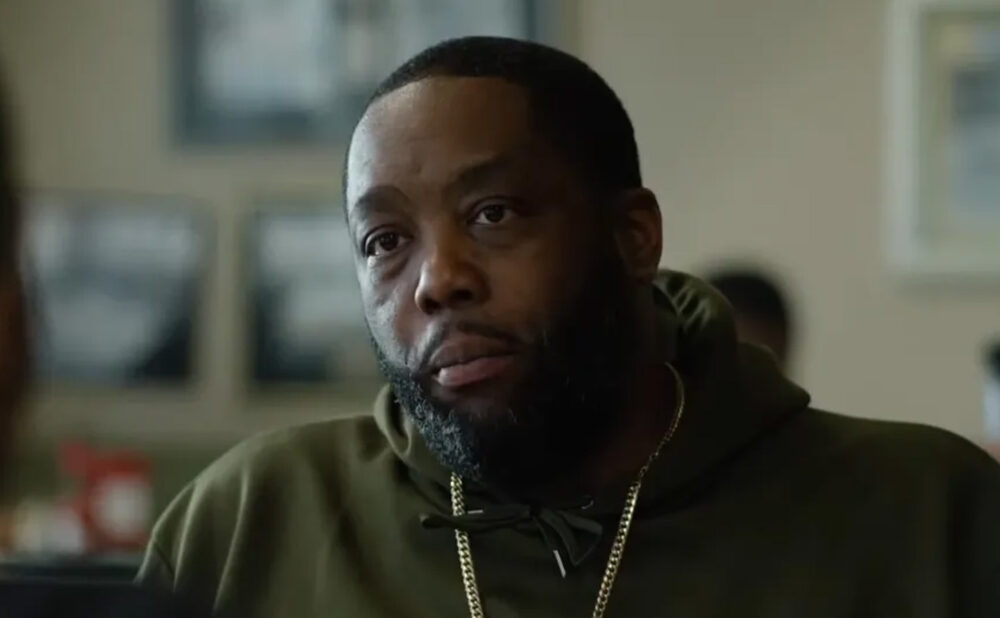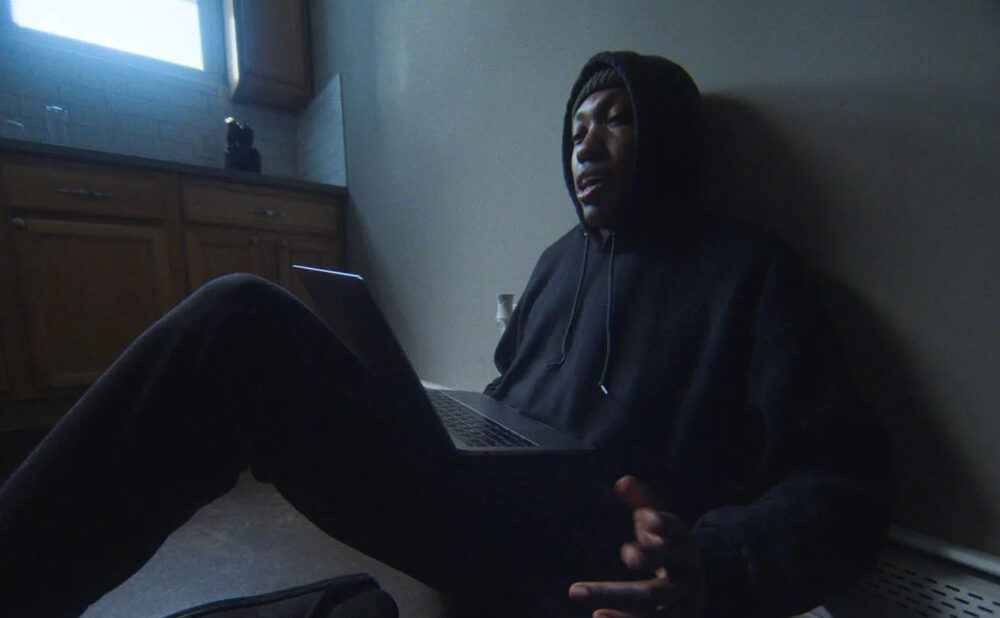‘As We Speak’ essential viewing on weaponization of rap lyrics
Documentary shows disturbing use of Black artists’ lyrics to incarcerate and limit Black expression
Rap music has had a target on it since its inception in the ’80s when U.S. Second Lady Tipper Gore demanded warning labels be put on hip hop albums. Ironically, that move saw “Parental Advisory” stickers become a source of pride, and director J. M. Harper’s first film, the remarkable new documentary As We Speak, shows the war on hip hop continues with tragic consequences and a historical precedent.
While charges against Grammy-winning rapper Young Thug draw headlines, Harper’s film shows that thousands of other lesser-known Black artists are victims of the weaponization of lyrics in the U.S. and British (and Canadian) justice systems: a singer’s lyrics and videos used against them in court to imply they are capable actually doing what they sing about.
Speaking wth NEXT over a Zoom, Harper explains he employs Bronx-based rapper Kemba to explore the story as the young rapper, in the midst of recording his own music, explores the implications of telling his truth through his lyrics as well as the history of oppressing the expression of Black artists.
Kemba travels through NYC, Chicago, Atlanta, Houston and London speaking with famous rappers, including Killer Mike, as well as emerging acts directly in the crosshairs of the legal system.
The film demonstrates the history of muzzling Black expression, from banning enslaved people from singing their songs to labelling jazz “devil’s music,” Gore’s branding of rap as dangerous music to present day.
The film powerfully demonstrates, often through juxtaposition, that white artists have historically been free to explore violent imagery in their songs without repercussions.
I speak with Harper and Kemba about their important film days before its premiere on Paramount+ Tuesday, noting some of the film’s most impactful points are made by demonstrating that artists like Freddie Mercury (“Momma, I just killed a man”) and even Shakespeare were free to depict violence without recrimination.
“We do the juxtapositions a few times to keep driving it home that there’s a racist double standard,” says Harper, where he speaks with NEXT along with Kemba. “Because a lot of people will hear the word ‘racism’ and turn off. But if you can show people that this is something that has been culturally programmed for hundreds of years. When you’re sitting in a jury seat, knowingly or unknowingly, you’ve been taught by culture that when white people do this [sing violent lyrics], it’s okay, it’s entertainment and it’s not for real; but when Black people do it, it’s for real. They’re actually violent, they actually intend to hurt people and that there’s no fiction here.
“And also, that they’re not smart enough to make fiction in the first place.”
A scene that shows gun wielding rappers reciting a Romeo and Juliet “gang scene” between the Capulets and the Montagues seems right out of the kind of hip hop video that is used against Black artists in court.
How jurors respond is critical as police forces around the world comb through Spotify and YouTube gathering “incriminating” music to later demonstrate a Black artist’s character being predisposed towards violence. In a world that celebrates Quinton Tarantino and so many other “violent’ white artists in all art forms, the injustice becomes screamingly apparent,
“Romeo and Juliet is basically a gang story,” chuckles Kemba. “Like the Bible.
“You wouldn’t hold Shakespeare in a courtroom the same way that you hold those rap artists — there’s something wrong here; there’s a double standard,” he says.
Harper explains he decided to tell the story through Kemba’s eyes because “the story hadn’t been told from the artists’ point of view.”
Kemba is “the investigator,” he explains, “travelling the world and figuring out for himself what was going on and whether or not someone like him was in danger.”
It’s an effective device with Kemba able to explore the issue with the authenticity of someone directly affected by it and able to speak with others as peers.
“It was a quick yes,” says Kemba of the project. “It sort of encapsulated everything I am passionate about.”
With almost endless examples, the film shows that being adjacent to crime can lead to rappers’ convictions or jailtime-reducing plea deals for a crime they didn’t commit because lyrics or a violence-laden video “demonstrates” their predilection for illegal acts.
“I might write a song about a dream I had or story that somebody else told me or about a vibe I got. The important thing is we don’t know the inspiration behind lyrics, so to use them is unjust, “says Kemba.
Artist after artist in As We Speak says if they can’t rap about violence, they can’t rap about the life they see. Drill music, a hybrid of trap and gangsta rap born on the bloody streets of south Chicago, depicts gun violence as everyday life in his community, according to Fatt Macc, who himself has been shot. “I can’t write about Miami Beach because I haven’t been there,” he says in the film. “This is what I know.”
“When you’re rapping about violence,” says Kemba, “and some people are turned off by the idea that a lot of art can be violent, even though we have this sort of appetite for violence in all these different art forms.”
Grindhouse screenings of violent ’70s kung-fu films in NYC and the Samurai-esthetic helped inform early hip hop imagery, as reflected in the Wu Tang Clan. Weaponizing hip hop lyrics, not only is a potent tool for incarcerating Black artists, but it also silences or restricts their stories. The issue of self-censorship is real.
“Damned if you do and damned if you don’t,” says Harper of self-censorship.
“If you censor yourself, then you’ve removed the core tenant of hip hop, which is authenticity.
“If you don’t censor yourself, then you’ve got a huge target on your back. Lyrics that didn’t even pertain to the case can be misconstrued and mischaracterized and used as character evidence — not even to say that you did the thing but that you were the type of person who could do this thing. It gets more and more perverse the way prosecutors are using this thing.”
“The prominent idea in hip hop is being real or being fearless,” says Kemba. “You’re not going to hear people say, ‘I’m censoring myself’; I don’t think the audience really wants to hear that, but you can see it affecting the art, people using disclaimers.”
The film also notes the use of the word “rapper” has become code for implying someone has gang tendencies or a predilection towards violence. Since viewing the film, I’ve noted that the Toronto dailies often use the term “rapper” when describing a Black victim of gun crime in the city, somehow implying their shooting “makes sense” in that context.
“It becomes a word that triggers preconceived notions and biases,” say Kemba. “These are just regular people that write and what they have in common is usually that they are Black or brown people, so if the prosecutor puts ‘rapper’ in the description, the jury already feels they’re scary or guilty.”
—As We Speak premieres on Paramount+ Tues., Feb. 27
As We Speak
Where: Paramount+
What: Movie, 96 mins.
When: Tue., Feb. 27
Genre: Documentary
Rating: NNNNN (out of 5)
Why you should watch: An astonishing look at the weaponization of hip hop lyrics to incarcerate Black youth in the U.S. — it happens in Canada too — that also leads to a “chill” that sees artists unable to speak their truth without fear of repercussions.








